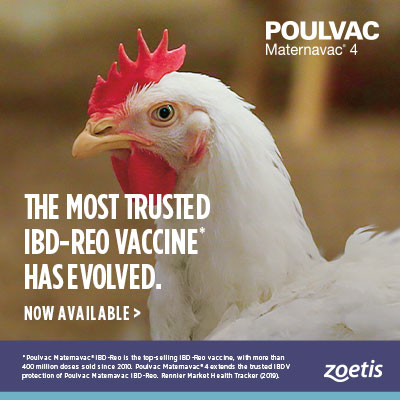Vaccine tweaks can make a big difference against key infectious bronchitis virus strain
New challenge studies have highlighted the best vaccine serotype combinations to tackle the DMV/1639 strain of infectious bronchitis virus (IBV), which has spread from the Delmarva area to become the predominant strain across the broiler belt and beyond.
Vaccination using commercial vaccines is the most common approach used against the strain, and the research looked at some of the main serotypes used in commercial flocks — Massachusetts, Arkansas, Georgia/98 and Georgia/08 — in two- and three-way combinations.
Commercial broilers were spray-vaccinated at hatch and placed into randomized isolator units with five isolators per vaccine treatment. Real-time polymerase chain reaction (PCR) was used to analyze tracheal samples for vaccine “takes” at 6 to 7 days. Birds were challenged with IBV at 25 to 26 days of age and protection was evaluated on day 31 using histological scoring and real-time PCR.
Massachusetts, Georgia/08 best bivalent; Georgia/98 good addition
Georgia/08 is thought to be the “main building block to achieve cross-protection against 1639,” said Kalen Cookson, DVM, Zoetis director of clinical research, who led the studies.
“There is probably some nonspecific immune response that is greater with the Georgia/08 vaccines. They colonize very well, certainly in comparison to Georgia/98 and Connecticut, for example.
When challenged with DMV/1639, the best results were seen with pairing Massachusetts with Georgia/08, while adding Georgia/98 to Georgia/08 proved a better combination than pairing it with Arkansas1.
“If you select a Massachusetts that also colonizes well and doesn’t shrink in the presence of Georgia/08, so you have two good-colonizing serotypes that are very distinct from each other, you probably have a better chance of getting good cross-protection against either 1639 or other strains.”
In cases of high challenge, where producers may not feel they are getting a level of efficacy seen before with a bivalent combination, Cookson suggested adding another serotype into the mix. Picking the right one can significantly improve results.
“We compared Arkansas to Georgia/98 as that third candidate and saw better results by adding the Georgia/98,” said Cookson, a factor he said was probably more about colonization. “Though Georgia/98 is a fairly mild vaccine, it usually colonizes better than the Arkansas vaccines we have available,” he added.
Why 1639 poses most issues for broilers
DMV/1639 is a particular problem for broiler producers, Cookson explained, for a variety of practical reasons.
“Broilers are more vulnerable to a novel virus that is highly pathogenic in its class and is different serotypically, simply because most people are only vaccinating that one time when they’re in the hatchery before they go out and are placed in their environments,” he said.
“In the table-egg industry and the replacement-pullet or broiler breeder industries, for example, those are long-lived birds. They have more opportunities for vaccination, not just one time but several times throughout the growing life. And they’re usually placed in environments that have a lower infection pressure.”
New data offers hope of good control
With its unique traits, good colonization and high persistence, DMV/1639 is here to stay for the foreseeable future, Cookson predicted. But with the vaccination options available, producers need not be too pessimistic.
“In field research2, we’ve seen companies’ complexes control 1639 infections and/or respiratory disease very well,” he added.
“The improvement in control of wild-type challenge, which we know is predominantly 1639, from going from just having one serotype in your program in broilers to going to a bivalent program and then going to a trivalent program — it was very, very clear that the recovery of wild types went down in a stepwise fashion to very low incidence. So that data pretty much supports what we had seen in controlled studies.”
1 Data on file. Additional Study No. 032419-KL-70AQO-KC-5820. Zoetis LLC.
2 Jordan B, Reith A. Results of an infectious bronchitis virus surveillance program in broiler chickens. 2021 Virtual International Poultry Scientific Forum. SCAD abstract T7 p24-25.
All trademarks are the property of Zoetis Services LLC or a related company or a licensor unless otherwise noted.
©2022 Zoetis Services LLC. All rights reserved. BIO-00344
Posted on August 30, 2022












